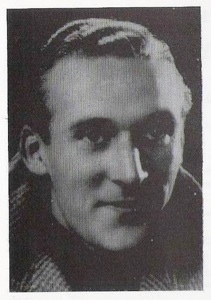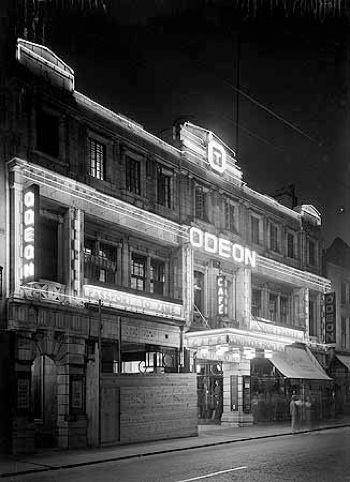The Beginning 1913 -1933
Denny’s Story
Denny Dennis was born in the City of Derby in England on November 1, 1913. His real name was Ronald Dennis Pountain, which in later years Denny changed to that of his stage name, Denny Dennis.
Denny’s background was humble and modest, and one which always helped Denny to keep his feet firmly on the ground even at the height of his fame. After leaving school, Denny had a variety of jobs in Derby. A clerk in a solicitor’s office, a projectionist and sound man at a local cinema (This was the pre ‘talkies era and sound had to be married up to the film) and a spell as an apprentice electrician at the old LMS Railway Works.
Denny had an older brother, Eric, who under the stage name Barry Gray was also to find a successful career as a vocalist with the popular bands of the 1930’s. The two brothers were very musical, and both aspired to enter the world of music and entertainment when they were young men.
Eric was the first to succeed, and he became a musician playing for various tea dances in Derby. Denny followed soon after, and with help from Eric, Denny began playing drums in a semi professional outfit called the ‘New Mayfair Dance Band’.
On one occasion Denny was asked to sing a number. The result was very promising. The ‘New Mayfair Dance Band’ then entered a Melody Maker dance band contest, where the editor of the Melody Maker, Percy Matheson Brooks, liked Denny’s rendition of the song, ‘Come To Me Wherever You Are’ and arranged for Denny to be auditioned by the successful band leader, Roy Fox.
Roy Fox was later to recall the audition in his 1975 autobiography:
"A friend of mine told me he knew a young boy who could sing extremely well and he would like me to hear him. This boy was an electrician, but he wanted to join a dance band, so I arranged to hear him. He sounded pretty good, but I told him that if he would study voice training for a while, there would be a good chance of him coming with me."
Denny was a little disheartened but not put off. Denny also took Fox's advice very seriously and spent several years taking singing lessons, even during the height of his popularity.
After a spell back in Derby, playing local venues, and also continuing to work as an apprentice electrician, with the help of Matheson Brooks, Denny gained work with the Freddy Bretherton Band at the ‘Spider's Web’ Roadhouse Club on the Watford Bypass, the main north road out of London.
The ‘Spider's Web’ gave the young nineteen-year-old Denny the exposure and confidence he needed. Soon after, the well-known and successful British bandleader Jack Jackson heard Denny, and liked what he heard. Immediately Jackson offered Denny the chance to do some broadcasts and to make some recordings with his band. These took place in late 1933 when Jackson replaced Henry Hall for a spell as the resident BBC Orchestra.
“He (Jack) used to come and collect me from the ‘Spider's Web’. He had a great big wonderful Packard car with great big outside exhaust ports, I remember it very well. He would take me to Broadcasting House to make the broadcasts. Then he said he wanted me to do a recording session as well, which I did about a week later”.
Denny made three records with the Jack Jackson band. One of these was ‘I’m Getting Sentimental Over You’, the theme tune to the Tommy Dorsey Orchestra in the States, and perhaps something of an omen of what was to come later.
But what was it about Denny’s voice and style that impressed so many of the top names of the day? A review in the ‘Melody Maker’ of late 1933 by Percy Matheson Brooks stated that;
“Dennis Pountain, the new find in vocalism, gave a very nice rendering of ‘I Cover The Waterfront’. He is definitely one of Bing Crosby followers and has a good voice, which will be better when he loses the touch of throatiness he gets occasionally!”
There is no doubt that Denny learnt about style from Crosby and there are obvious similarities. Denny’s voice has a similar timbre, and Denny sang in the popular ‘Crosby’ style of the period, as did many others. But Denny was no imitator, and he always disliked the tag that he was an English Bing Crosby.
“I used to lock myself away in the front room and I used to play records and sing over and over and get this phrase and that phrase off. I used to have quite a lot of Crosby records but I studied other people too like the great Ella (Fitzgerald), and also Billie Holiday. I thought style was going to become a very important thing”.
But as Denny was at pains to point out:
“Never at any time did I encourage this business of being known as the British Bing Crosby. True, there is no greater admirer of Bing than me, but I never set out to imitate him and to be regarded, as a second Crosby was the last thing I wanted. I liked to think I had a style of my own.”
Following the broadcasts and recordings with Jack Jackson, and a further spell at the ‘Spider’s Web’, Denny returned once again to Roy Fox for a second audition. Fox was again impressed, and this time he offered Denny a trial period with his band. But Denny’s talent won through, and within a few days, Denny was allowed to broadcast with the Roy Fox Band. Fox later recalled:
“When Denny first came to me he had not had a great deal of experience of singing with dance bands, but I detected a little something in his voice. I told Denny he needed a little more experience. It was almost a year later when I again heard Denny. I had no hesitation in signing him up. His name was Dennis Pountain, but we agreed to change it to Denny Dennis. Denny soon began to make a name for himself on my broadcasts and the records and I knew his success was assured.”
On November 22nd 1933, the young twenty-year-old Ronald Dennis Pountain made his first broadcast with Roy Fox Band, singing, ‘Thanks’, ‘Don’t Blame Me’, and ‘The Day You Came Along’. Ronald Dennis Pountain quit his job as apprentice electrician and turned professional as the singer ‘Denny Dennis’.

The Odeon Cinema - Derby
